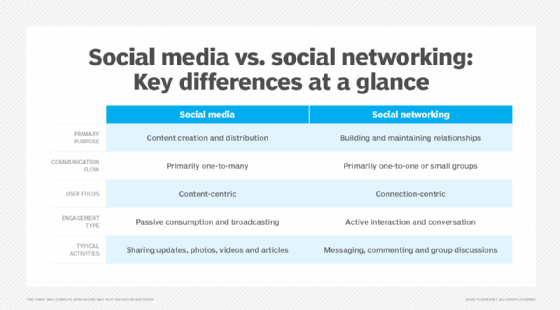
Getty Images
What's the difference between social media and social networking?
Social media and social networking appear to be interchangeable terms, but they serve different use cases. Learn the difference between social media and social networking.
While the terms social media and social networking seem to be interchangeable, they have distinct differences. Essentially, social media is a platform for broadcasting information, whereas social networking is a platform for communicating with one another. Social media is a communications channel, whereas, in social networking, the communication has a two-way nature. Let's dive deeper into the difference between social media and social networking.
What is social media?
The term media usually connotes traditional outlets, such as newspapers, magazines and television. Yet, when you add social in front, the term takes on an entirely different vibe. Social media adds a technology component, as well as flexibility, when it comes to how a person consumes, shares and collaborates with what is being presented. Thus, social media can best be described as an internet-based way to publish or broadcast digital content that readers can fully interact with.
Anyone can publish social media content. Traditional news media outlets, like CNN and Fox News, publish their own content for digital consumption. Businesses and organizations do so as well. Even your child's local soccer club can create social media content for members to read, watch and interact with.
Examples of social media

What is social networking?
Consider social networking in the context of who a user is receiving content from. First, social networking requires a platform. Users join a social network platform and begin connecting -- or networking -- with other users. This is done so users can choose who they want to receive communications from. In some cases, communication is one-way, while, in others, it's bidirectional or multidirectional.
In other words, social networking is like selecting radio presets on a car stereo. It helps streamline access to what you do and don't want to consume. And, again, content can be delivered through personal or business contacts, in the form of news media, or any other community or organization the user is interested in.
Examples of social networking
The difference between social media and social networking
Even with the previous description, there are nuances to consider. Facebook, as a social networking site, is an example of how the terms can differ and yet somewhat overlap. You register and post your profile, connect with friends and comment on topics in a generally interactive way. On that same social networking site, companies set up a presence and use Facebook as a way to communicate their brand and gain a following. This is distinctly a use case for both social media and social networking.
That said, there is a clear difference between the two. Social media requires a social network in order to distribute content to those who wish to consume and interact with it. Thus, the social media network is the underlying technology and source of human connections, while social media focuses strictly on what is being published and consumed within the social networking platform.
Editor's note: This article was updated in 2025 to improve the reader experience.
Andrew Froehlich is founder of InfraMomentum, an enterprise IT research and analyst firm, and president of West Gate Networks, an IT consulting company. He has been involved in enterprise IT for more than 20 years.
Paul McMillan contributed to this piece.







